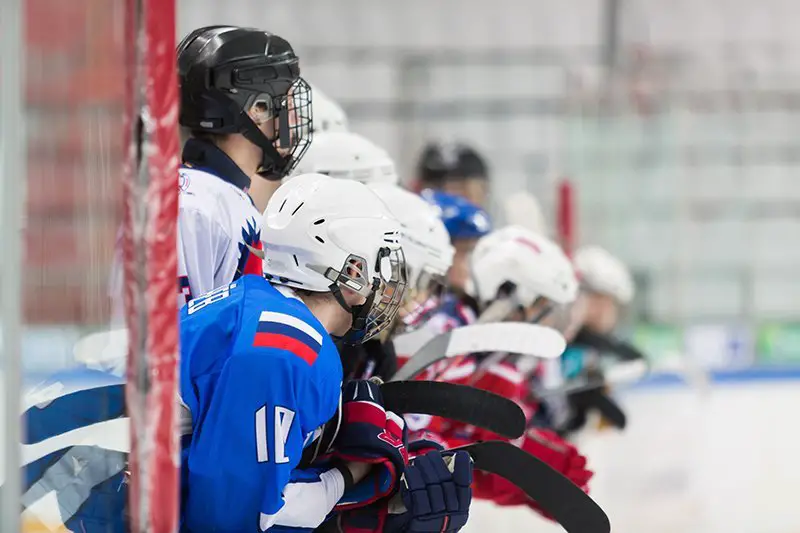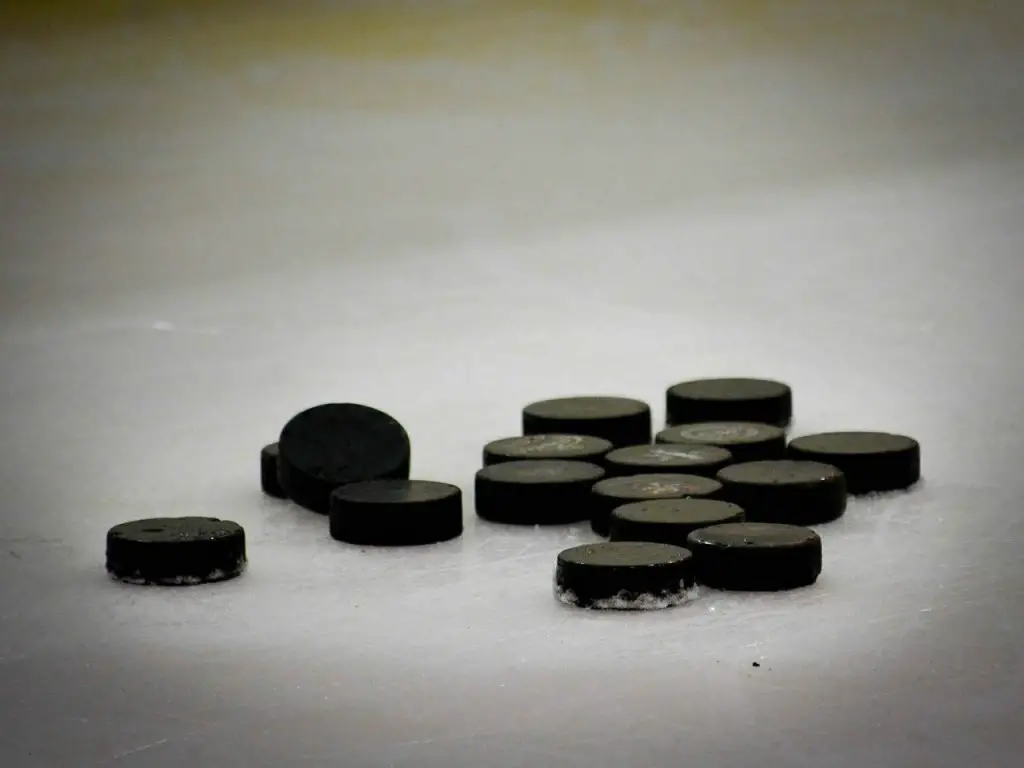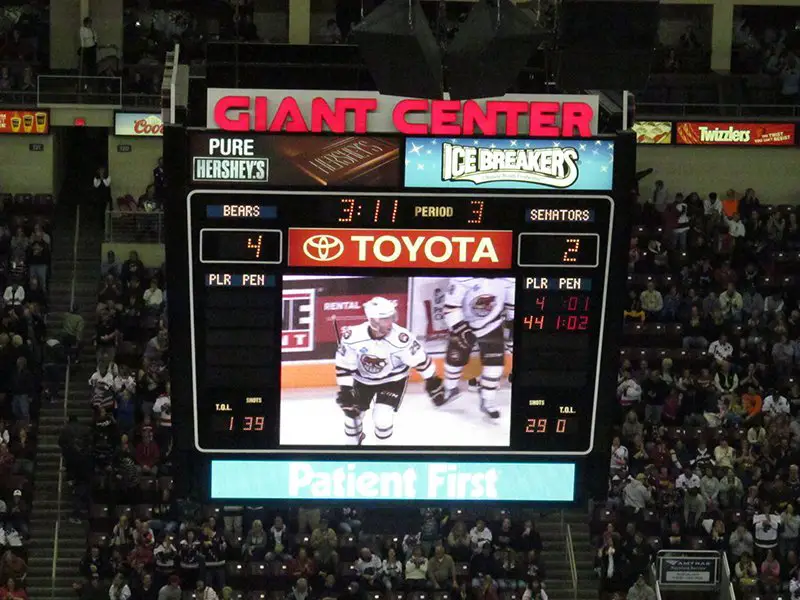Hockey is widely regarded as one of the hardest sports to play.
Each position in hockey comes with its own unique set of challenges and requirements. But what position in hockey is the hardest to play?
In hockey, the toughest position to play is goaltender. Being a goalie in hockey requires extreme mental focus and advanced physical abilities, like being able to perform the splits. The goalie needs to be performing at the top of his game every night for his team to have a chance of winning.
Not convinced? Let’s get into more detail.
Table of Contents
What makes being a goalie so much harder than other positions?
Being a goaltender in ice hockey requires an entirely different set of skills and abilities than any other position.
But what exactly makes being a goalie in hockey so much more difficult than being a forward, center or defenceman?
Mental toughness
Don’t get me wrong, players who play other positions need to be mentally tough as well, but not like the goalie.
Hockey goalies need to be able to compartmentalize every aspect of their game. If you as a goalie are unable to quickly move past that bad goal you just allowed or are quickly rattled by an opposing player being a nuisance in your crease, you aren’t going to have much success.
Being able to handle the extreme pressures that come with being a hockey goalie is essential.
For example, your team is in double overtime playing for the Stanley Cup. Every single player on your team is relying on you to keep their childhood dream alive by not allowing a goal.
That’s a lot of pressure, isn’t it?
Goalies need to be mentally tough and capable of putting things like that out of their mind, focusing solely on what is in front of them.
Hockey IQ
Hockey IQ is the way players on the ice can read the game, their ability to see a play before it unfolds and react accordingly.
People who play other positions can get by on raw skill and athleticism without necessarily having the best hockey IQ. But not a goalie.
All goalies require the ability to see and predict the game in front of them at a high level. For example, during a 2 on 1 against, being able to read if the player is going to shoot or pass and giving yourself enough time to make the corresponding movements to make the save.
A goalie without high hockey IQ isn’t ever going to make it to the highest levels of competition like the NHL.
Physical abilities
Most players at a high level are very athletic and possess great physical abilities. However, goalies require a different set of physical abilities than your average player.
Flexibility
Being a goalie requires great flexibility, you need to be able to stretch over from one post to the other at a moment’s notice. That Majority of high level goalies work on their flexibility all year round to avoid injuries that can come with doing the splits and other acrobatic maneuvers to stop the puck.
Hand eye coordination
Hand-eye coordination is something every high level hockey player possesses, but none like the goalie.
Goalies are required to be able to snatch a puck going speeds of up to 100 mph out of the air, I’m sure I don’t have to tell you that tracking a small object moving that fast is extremely difficult and requires elite level hand-eye coordination.
If you want to improve your hand-eye, check out this video.
Reaction time
Hockey is played at super high speeds, players not only skate at a high rate of speed, but they also shoot the puck at a high rate of speed.
Although goalies focus more on their positioning than solely relying on their reaction time, goalies do require excellent reaction time in ways that other positions on the ice do not.
Being able to react within milliseconds of something happening on the ice when required is the difference between being a high level goalie and a beer league goalie.
For this reason, most goalies spend their off-seasons working on their reaction time.
Plus, good reaction times often lead to the best desperation saves that will be in your highlight reel forever.
Development time
The average age of a goalie in the NHL who has played at least one game is 27.
It’s not rare to see forwards, centers and defencemen get drafted at 18 and make it into the NHL before the age of 20.
However, you would be hard-pressed to find a goalie who cracks an NHL lineup before the age of 20. This is because goalies take far more time to develop into a goalie that is capable of taking on the best players in the world. Most never make it.
Most goalies don’t solidify their spot as an NHL goalie until they are between the ages of 23-25.
In fact, during the 2020-2021 NHL season there were 11 goalies under the age of 23 who registered games played, but only 2 of those played more than 10 games.
The most important position in hockey
Goalies need to be near the top of their game every single night, one bad lapse in judgement or one wrong move can be the difference between a win and a loss. Whereas, if forwards or defencemen have a bad game, you still have a high chance of being able to secure a win.
Not only is being a goalie the hardest position in hockey, it’s also the most important position in hockey.
Ever heard the saying “their goalie stole that one”? If the opposing team is dominating you all night, you still have a shot at winning if you have a competent goalie playing lights out.
No other position in hockey has more influence on the game than a goaltender, as they possess the ability to “steal” a win for their team.
If your team doesn’t have a good goalie, your season isn’t going to go very well.
What is the easiest position in hockey?
I want to be clear that in hockey, there is no easy position, so if you are reading this and are upset, don’t be. The fact is, some positions are easier than others, but that doesn’t make them easy.
So what is the easiest position to play in hockey? The easiest position in hockey is winger, left or right. The main job of a winger is driving offense and dictating the play in the offensive zone. Wingers often play along the boards, whether that be dumping the pick into the offensive zone and retrieving it or chipping pucks out along the boards in your defensive zone.
Winger vs Centerman
Centers do things that wingers don’t, including taking face offs (unless the center gets kicked out, in which case a forward comes in to take the draw).
Playing center is a mix of offense and defense, you need to be able to read and react to plays in all three zones; offensive, neutral and defensive with the ability to lead a rush up the ice. Whereas, a forward’s main job is dictating the play in the offensive zone and chipping in a long the boards in the defensive zone.
Winger vs Defenceman
As a defenceman, you need to be able to read and react to offensive players closing in on your zone at high rates of speed. Being able to skate backwards efficiently while doing so is a skill in its own right, and something forwards rarely have the concern themselves with.
Breaking out of the defensive zone and starting the offensive rush up the ice into the opposing team’s zone is often times in the hands of a defenceman.
Defencemen need to be able to play under pressure in their own zone as well as control the blue line in the offensive zone, with the ability to read plays quickly once they are pushed back into the neutral zone and react accordingly.
Winger vs Goalie
We’ve already established that being a goalie in hockey is the hardest position in the sport.
The forward’s main focus is creating offense, the goalie is focused on stopping pucks. If the forward doesn’t create offense and score goals, centers and defencemen are capable of scoring goals to win the game, whereas the goalie is the only one responsible for keeping pucks out of the net.
A forward will never deal with the type of pressure a goalie is faced with on a nightly basis.
Final thoughts
A good goalie is quite literally the difference between having a good team and a bad team.
The object of the game of hockey is to score goals, so naturally the person in charge of preventing goals will be looked at as the most important part of any team.
But, don’t let this deter you from becoming a goalie. I was a goalie growing up, and it was definitely hard, but once you get the hang of it, it can be the most rewarding position on the ice.
If you’ve like this post, you may like an article I wrote about what position scores the most in hockey.



